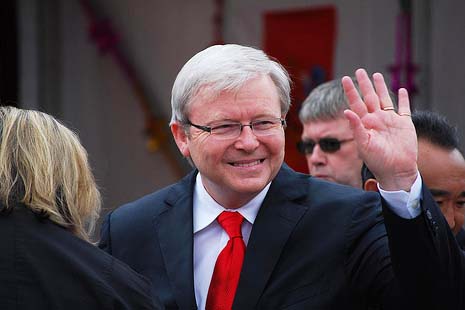AT SOME point in every election campaign, an utterly predictable question will be asked of the prime minister and the opposition leader. If you aren’t re-elected (or elected) as prime minister, will you undertake to serve a full term in parliament? This is hardly Walkley Award–winning stuff, but it is rolled out in keen anticipation of the post-election “gotcha” moment when a defeated prime minister (who will have predictably denied such an intention) pulls the plug and quits parliament.
As someone else once said, occasionally we have to be able to trust leaders to lie to us. This is one such point in the political cycle. Among the prime ministers defeated since the second world war, it is difficult to think of any of the “stayers” who added anything to the body politic by remaining; and it is impossible to conclude that any of the “quitters” did other than the right thing in resigning from parliament.
Perhaps Ben Chifley is the exception. After he was defeated in 1949, he stayed on as opposition leader, lost the 1951 election and was still leader at the time of his death later that year. He might well have managed a better election result in 1951 than any of those Labor frontbenchers who would have replaced him as leader, and he was certainly able to exert some control over the warring forces that would ultimately split the party. But, after long service as treasurer and prime minister, he was surely entitled to step down to a well-earned retirement.
Robert Menzies was the only postwar prime minister to leave the Lodge entirely on his own terms, ejected neither by the people nor by his party. (Harold Holt escaped both fates by falling into the “died in office” category.) After resigning as prime minister in January 1966, Menzies announced his resignation from parliament as well. It is doubtful whether any journalist would have dared ask Menzies the “full term” question back at the 1963 election: it would not have been a good career move.
Like Kevin Rudd under Julia Gillard, John Gorton stayed in cabinet after his defeat by William McMahon (indeed, he was deputy leader), but the necessary discipline eluded him and he was eventually sacked for breaching cabinet solidarity. He then lingered on for more than four years as a backbencher, eventually stepping down at the 1975 election. While McMahon bungled through the remaining months of Coalition government, it’s possible that Gorton clung to a hope of reinstatement as leader. But once this fantasy ended, it is hard to see why he bothered running for his seat again in 1972 and 1974.
McMahon lingered even longer than Gorton, remaining in parliament for nearly ten years after his defeat at the 1972 election. He may have thought he played an elder statesman role, but it is doubtful if anyone shared this view.
Whitlam followed Chifley’s example and stayed on as opposition leader after the 1975 defeat: a bad move for both Whitlam (whose dreams of a comeback were totally unrealistic) and the caucus who re-elected him, whose members, letting their hearts rule their heads, felt they owed him so much and were determined not to let Rupert Murdoch dictate their decision. The 1977 loss, which effectively repeated the magnitude of the 1975 defeat, saw Gough finally bow out of parliament, and may also have cost Labor the 1980 election.
Malcolm Fraser wasted no time in quitting parliament after losing office in 1983, heading off for a productive post-parliamentary life and serving as the nearest thing to best practice in this regard. Bob Hawke followed suit after being rolled by Paul Keating, as did Keating after being rolled by the electorate. Howard, beaten nationally and in his seat, saved his constituents a by-election.
Rudd’s career path needs no elaboration: his failure to leave parliament in 2010 was clearly linked to an ultimately vindicated belief that he could mount a comeback. Gillard’s decision to leave parliament when that came to pass was dignified and correct.
It is clearly time for Rudd to follow suit: there is certainly no elder statesman role beckoning for him, and his continued presence is a reminder of a past that Labor needs to lay to rest. Parliamentary seats should be filled by those eager to serve their constituents and make their way in parliament, with a front-bench job a legitimate ambition for many. The electors in Rudd’s seat are entitled to no less. Fears of the loss of the seat in a by-election are of no relevance given the new government’s majority. In any event, Labor managed to retain Anna Bligh’s state seat (an area that forms part of Rudd’s electorate) after she quit parliament following a much more comprehensive defeat than occurred federally.
Lacking a House of Lords to which to consign former prime ministers, Australia is best served when they leave parliament with dispatch. It’s time, Kevin. •




